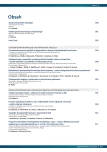Exclusive enteral nutrition – first-line therapy of Crohn’s disease in children
Authors:
E. Karásková
Authors‘ workplace:
Dětská klinika LF UP a FN Olomouc
Published in:
Gastroent Hepatol 2015; 69(6): 531-535
Category:
doi:
https://doi.org/10.14735/amgh2015531
Overview
Inflammatory bowel diseases include Crohn‘s disease and ulcerative colitis. Up to 20% of patients with Crohn’s disease are diagnosed before the age of 18 years. The onset of the disease in childhood is often accompanied by growth retardation and impaired bone metabolism. The therapeutic approach differs in certain aspects from the treatment of adult patients. Particularly, exclusive enteral nutrition is recommended as first-line therapy to induce remission in children with newly diagnosed Crohn’s disease. Over recent years this therapy has often replaced corticosteroids. According to available studies, this treatment induces endoscopic remission better than corticosteroids, while improving bone metabolism, growth and nutritional status. Exclusive enteral nutrition is generally well tolerated and with proper administration its complications and side effects areminimal.
Key words:
Crohn’s disease – child – enteral nutrition
The author declares he has no potential conflicts of interest concerning drugs, products, or services used in the study.
The Editorial Board declares that the manuscript met the ICMJE „uniform requirements“ for biomedical papers.
Submitted:
21. 10. 2015
Accepted:
6. 11. 2015
Sources
1. Ruemmele FM, Veres G, Kolho KL et al. Consensus guidelines of ECCO/ ESPGHAN on the medical management of pediatric Crohn’s disease. J Crohns Colitis 2014; 8(10): 1179– 1207. doi: 10.1016/ j.crohns.2014.04.005.
2. Bousvaros A. Use of immunomodulators and biologic therapies in children with inflammatory bowel disease. Expert Rev Clin Immunol 2010; 6(4): 659– 666. doi: 10.1586/ eci.10.46.
3. Pigneur B, Seksik P, Viola S et al. Natural history of Crohn’s disease: comparison between childhood- and adult-onset disease. Inflamm Bowel Dis 2010; 16(6): 953– 961. doi: 10.1002/ ibd.21152.
4. Navas-López VM, Blasco-Alonso J, Lacasa Maseri S et al. Exclusive enteral nutrition continues to be first line therapy for pediatric Crohn’s disease in the era of biologics. An Pediatr (Barc) 2015; 83(1): 47– 54. doi: 10.1016/ j.anpedi.2014.02.027.
5. Zachos M, Tondeur M, Griffiths AM. Enteral nutritional therapy for induction of remission in Crohn’s disease. Cochrane Database Syst Rev 2007; 1: CD000542.
6. Kansal S, Wagner J, Kirkwood CD et al. Enteral nutrition in Crohn’s disease: an underused therapy. Gastroenterol Res Pract 2013; 2013: 482108. doi: 10.1155/ 2013/ 482108.
7. Cameron FL, Gerasimidis K, Papangelou A et al. Clinical progress in the two years following a course of exclusive enteral nutrition in 109 paediatric patients with Crohn’s disease. Aliment Pharmacol Ther 2013; 37(6): 622– 629. doi: 10.1111/ apt.12230.
8. Soo J, Malik BA, Turner JM et al. Use of exclusive enteral nutrition is just as effective as corticosteroids in newly diagnosed pediatric Crohn’s disease. Dig Dis Sci 2013; 58(12): 3584– 3591. doi: 10.1007/ s10620-013-2855-y.
9. Sanderson IR, Udeen S, Davies PS et al. Remission induced by an elemental diet in small bowel Crohn’s disease. Arch Dis Child 1987; 62(2): 123– 127.
10. González-Huix F, de León R, Fernández-Bañares F et al. Polymeric enteral diets as primary treatment of active Crohn’s disease: a prospective steroid controlled trial. Gut 1993; 34(6): 778– 782.
11. Kaakoush NO, Day AS, Leach ST et al. Effect of exclusive enteral nutrition on the microbiota of children with newly diagnosed Crohn’s disease. Clin Transl Gastroenterol 2015; 6:e71. doi: 10.1038/ ctg.2014.21.
12. Lee D, Albenberg L, Compher C et al. Diet in the pathogenesis and treatment of inflammatory bowel diseases. Gastroenterology 2015; 148(6): 1087– 1106. doi: 10.1053/ j.gastro.2015.01.007.
13. Ruuska T, Savilahti E, Mäki M et al. Exclusive whole protein enteral diet versus prednisolone in the treatment of acute Crohn’s disease in children. J Pediatr Gastroenterol Nutr 1994; 19(2): 175– 180.
14. Borrelli O, Cordischi L, Cirulli M et al. Polymeric diet alone versus corticosteroids in the treatment of active pediatric Crohn’s disease: a randomized controlled open-label trial. Clin Gastroenterol Hepatol 2006; 4(6): 744– 753.
15. Lee D, Baldassano RN, Otley AR el al. Comparative Effectiveness of Nutritional and Biological Therapy in North Ame-rican Children with Active Crohn’s Dis-ease. Inflamm Bowel Dis 2015; 21(8): 1786– 1793. doi: 10.1097/ MIB.0000000000000426.
16. Ludvigsson JF, Krantz M, Bodin L et al. Elemental versus polymeric enteral nutrition in paediatric Crohn’s disease: a multicentre randomized controlled trial. Acta Paediatr 2004; 93(3): 327– 335.
17. Adamcová M, Bajer M, Bajerová K et al. Doporučení Pracovní skupiny dětské gastroenterologie a výživy ČPS pro diagnostiku a léčbu nespecifických střevních zánětů u dětí. Čes Slov Pediat 2012; 67 (Suppl 2): 4– 48.
18. Esaki M, Matsumoto T, Nakamura S et al.Factors affecting recurrence in patients with Crohn’s disease under nutritional therapy. Dis Colon Rectum 2006; 49 (Suppl 10): S68– S74.
19. Karásková E, Vydra D, Smolka V et al. Refeeding syndrom v dětském věku. Čes-slov Pediat 2014; 69(6): 363– 369.
Labels
Paediatric gastroenterology Gastroenterology and hepatology SurgeryArticle was published in
Gastroenterology and Hepatology

2015 Issue 6
- Metamizole vs. Tramadol in Postoperative Analgesia
- Metamizole at a Glance and in Practice – Effective Non-Opioid Analgesic for All Ages
- Possibilities of Using Metamizole in the Treatment of Acute Primary Headaches
- Current Insights into the Antispasmodic and Analgesic Effects of Metamizole on the Gastrointestinal Tract
- Spasmolytic Effect of Metamizole
Most read in this issue
- Ursodeoxycholic acid (Ursosan® capsules)
- Exclusive enteral nutrition – first-line therapy of Crohn’s disease in children
- The results of liver transplantation in Slovak children
- The importance of genetic testing in children with idiopathic chronic pancreatitis
